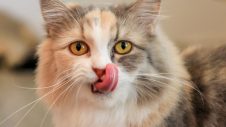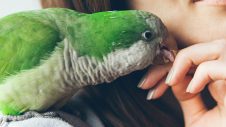What food should I feed my pet?
Nutrition plays a vital role in the health and well-being of your pet. It comes as no surprise that different pets have different needs when it comes to food. Knowing what option is best for your pet with so many available diets can be difficult.
The goal of animal nutrition is to ensure our pets receive nutrition that best supports their individual needs. Certain foods optimise health, well-being, and longevity. Working with a vet to identify your pet’s individual needs is an important part of pet health care.
A nutritional assessment allows vets to make diet recommendations to ensure your pet has a long, healthy life. Your vet will consider the following factors:
Weight
Obesity is one of the most common health disorders seen in cats and dogs. An underweight pet may also signify an underlying medical condition that will need to be assessed by your vet. Identifying if your pet has a weight problem is essential for their health and well-being. Body condition score charts can help you visualise if your cat or dog has a weight problem.
Age
Cats and dogs have specific nutritional needs depending on their life stage. During the first year of life, puppies and kittens have higher nutritional needs to support their rapid growth and development. Once your pet reaches adulthood, they require an ideal balance of vitamins and minerals to help them stay healthy throughout their adult years. Just as we give special attention to the nutritional needs of puppies and kittens, dogs and cats heading into their later years require a senior food diet to maintain their quality of life and increase longevity.
Breed and size
Certain breeds mature differently and can be predisposed to diseases like arthritis, skin allergies, dental disease, and weight issues. Feeding foods specifically formulated for these conditions ensures that your pet will receive the nutrients best suited to them. For example, large breeds can be prone to orthopaedic issues, and smaller breeds can be more likely to have dental health and urinary tract concerns.
Specific Needs
Appropriate feeding throughout your pet’s life can not only help prevent some health issues but can also assist in managing other diseases. There are times when vets may prescribe a specific diet if a pet has a disease or condition that needs nutritional support.
How do I choose the best food for my dog?
With so many high-quality pet food products available, choosing the best food for your dog can seem daunting. The nutritional needs of your pet have evolved from those of their pre-domesticated ancestors. The skin, bones, muscle, and intestinal contents of their prey were once considered a tasty and nutritious meal. To ensure your pet’s diet meets all of their needs, you should consider this evolution.
Modern research into canine nutrition has produced many premium-quality dietary options for your pet to thrive on. Super premium diets have been shown to increase your pet’s lifespan and quality of life. Foods by Hill’s Science Diet, Royal Canin, and Eukanuba are recommended by our Greencross veterinarians. Learn more about the benefits of super premium food.
Available diet options
Home prepared diets
Your pet will surely enjoy your home cooking. However, these meals are often not nutritionally complete. Dietary imbalances can result in health problems, including bone disease in growing pups, skin and coat conditions, dental disease, and intestinal disorders. To ensure your pet receives the necessary calcium and phosphorus balance and vitamins, minerals and fatty acids, ensure you include scientifically formulated, nutritionally balanced products in their daily diet.
Supermarket foods
Food found in major supermarkets usually provides your pet’s basic nutritional needs, but they’re often filled with cheaper ingredients like cereals, offal, and soybeans. These additives can reduce palatability and digestibility and increase flatulence and odorous stools. Artificial colours and flavour enhancers upset the balance of fatty acids vital for a healthy skin and coat. Always read the label carefully.
Premium veterinary diets
Hill’s Science Diet, Royal Canin, and Eukanuba are quality pet foods available from veterinary clinics and some pet specialty stores like Petbarn. They are available in various formulations to suit pets of all ages and activity levels and come in both tinned and dry varieties.
Advantages of a premium veterinary diet
- All protein is of a high biological value and completely balanced.
- No soybean products are used (they don’t contain the full range of amino acids and can interfere with the digestion of other nutrients).
- No added artificial colours or flavour enhancers.
- It contains optimal fibre levels (too much dietary fibre results in reduced digestibility and interferes with the absorption of other nutrients).
- Fibre from beet pulp provides a blend of soluble and insoluble fibre, which promotes good bacteria in the bowel.
- It offers the correct balance of fatty acids for healthy skin and coat and helps control inflammation and allergy-related itching.
- It is highly palatable, which means less waste through uneaten food.
Diet is as important for our pets as it is for us. To minimise the health risks associated with poor diet, like pet obesity, make sure your pet is eating the most suitable food for their breed and life stage.

 Greencross Vets
Greencross Vets 







